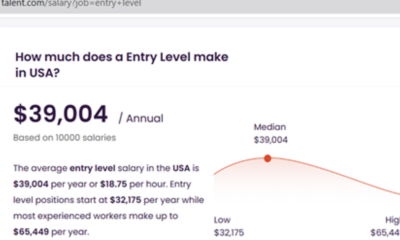Accounting
Quality advisory doubles the acquisition probability for startups
Published
8 months agoon


How can you quantify the impact of high-quality startup advisory on business outcomes? My firm, Kruze Consulting, identified one method — startups with high-quality CPA firm advice are twice as likely to get acquired than the average startup.
One of the most important outcomes that startup founders, and their venture investors, want is to sell their startups and achieve an “exit.” Founders turn to boutique consulting firms to provide them with the advice, systems and metrics they need to manage their growing businesses. But one major benefit that the best accounting firms provide is critical advice when it’s time to sell the startup. And our data shows that founders do benefit from this CPA advice!
Carta, the largest startup-focused capitalization software vendor, regularly publishes helpful analysis designed to help startup founders and VCs. Recently, they published data on the outcomes of 3,067 startups incorporated in 2018. Only 161 of these were eventually acquired: 5.2%. Kruze Consulting provides accounting and CFO services for more than 800 venture-funded US startups, and when comparing their clients incorporated in 2018 Kruze found that more than 11% were acquired.
So what’s driving that difference?
We think it’s at least partly our high quality accounting!
Accountants offer critical advice during exits
When a small company is acquired by a major public corporation, like many of our clients have been (Apple, JP Morgan Chase, Cisco, etc.), the due diligence is intense. Large acquirers have teams dedicated to M&A, including accounting, tax and finance diligence groups. Making it through this difficult diligence process is not easy, and having organized financial statements, tax returns and financial metrics is just the first step. For business owners, having CPAs as advisors, who know the business and who can jump on the phone to answer technical diligence questions, is not only invaluable, but a major stress-reliever in a very challenging moment.
Outsourced accountants keep companies ready
We’ve also found that many startup acquisition offers appear suddenly. Partnership discussions turn into acquisition discussions; the public company’s major competitor makes an acquisition and they must respond. If the startup wasn’t using a high-quality accounting firm, the time it takes to retroactively catch up diligence materials can derail and deal. For the acquirer, buying a startup that has all of these up to date, organized and ready for diligence inspires confidence in the deal.
Solid accounting metrics makes companies more successful
Of course, it’s not just about getting a deal done. Startups with solid, reliable, constantly updated metrics are able to make better decisions across the board — whether it’s hiring, new products, new markets, etc. I believe (and have seen for myself) that founders with the ability to make informed decisions swiftly will out compete the market and outlast the competition. Solid accounting makes companies run better, from more clearly understanding how to manage cash flow, strategizing for growth and hiring the right people at the right times.
Most acquisitions happen when a company is small enough to still use an outsourced accounting provider
Most startup acquisitions happen before Series B funding — according to Carta, 93% of the companies in the sample set that got acquired were pre-seed through Series A stage startups. At the early stages, many startups don’t prioritize accounting operations – favoring product and growth over the operations side. For Founders in those early stages, this oversight often feels correct. Afterall, Founders are often stretched thin, wearing many hats and their startups must grow to survive and raise future capital. However, failing to allocate proper time and resources to the accounting stack can diminish all of the hard work chasing growth and developing solid products. This is where outsourced accounting partners really benefit startups, being there to take the work off of their plate and letting them continue to focus on growing their business.
The vital role of accountants in clients’ success
As trusted advisors to startup founders, we as accountants play a crucial role in guiding our clients through some of their most stressful moments — the challenges of growth and the complexities of the acquisition process. Our data pretty definitively shows that startups working with access to high-quality accountants achieve better outcomes.
This is a legacy accountants can be proud of, and is a strong reason for us to have chosen this awesome profession.
It’s a mistake to assume that founders only rely on accountants for compliance. In reality, founders look to us for strategic guidance, data-driven insights, and expert advice on navigating the financial aspects of running a business. By providing accurate, timely financial information and proactive recommendations, we enable our startup clients to make informed decisions that position them for success.
Our value as accountants shines brightest during the high-stakes moments business founders face. As our clients’ trusted advisors, we play a vital role in ensuring that their companies are diligence-ready, with clean financials and well-organized records – whenever they are needed. Our deep understanding of their businesses and ability to provide prompt, knowledgeable responses to due diligence inquiries can be the difference between a smooth transaction and a derailed deal. And for those of us who have advised on many companies’ exits, the steady-hand of experience is a value our clients will never forget.
At times, the work we do may feel routine or mundane, because let’s be honest, it can be sometimes. But we shouldn’t forget the profound impact we have on our clients’ lives at their most stressful moments. Our expertise, guidance, and unwavering support are the foundation upon which founders build their dreams.
As accountants, we are more than just number crunchers. We are essential partners who provide stability and guidance to our clients as they navigate the complex business challenges that they will ever face. Our work, though sometimes tedious, is a testament to our dedication and the vital role we play in shaping the future of business.
So, to my fellow accountants, take pride in the value you bring to your clients! Embrace the challenges and the opportunities that come with being a trusted advisor. Remember, your impact extends far beyond the numbers on a spreadsheet. You are the backbone of the startup ecosystem, and your contributions are essential to the success of the businesses you serve.
You may like

$20 million questions; speared; tag, you’re it; and other highlights of recent tax cases.
Miami: Beatriz Toledo, 61, owner of a tax prep business who pleaded guilty in December to aiding and assisting the preparation of false returns, has been sentenced to almost five years in prison and a year of supervised release.
Toledo owned Immigration and Tax Service Group and for tax years 2017 through 2021 prepared false and fraudulent returns for clients. The returns included false claims for the Residential Energy Credit, false itemized deductions for state and local sales taxes, and false business expenses. She submitted some 7,800 returns with fraudulent claims for energy credits, resulting in her clients’ underpayment of about $20 million in federal taxes. Her practice received some $7.1 million in prep fees that it took out of clients’ refunds.
She did this in violation of a permanent injunction entered against her in 2010. In that civil case, the U.S. sued to bar Toledo from preparing returns; Toledo agreed to an injunction, which the court entered in 2020. She continued to prepare false returns and was indicted last year.
Toledo was also ordered to pay more than $20 million in restitution to the IRS.
Owings Mills, Maryland: Resident Maureen Wilson has been convicted for conspiracy to commit insurance fraud and for related charges for wire fraud, money laundering and filing false tax returns.
She was convicted of one count of conspiracy to commit mail and wire fraud, four counts of mail fraud, two counts of wire fraud, one count of conspiracy to commit money laundering, one count of money laundering and two counts of filing a false return. She was acquitted of one count of mail fraud.
She conspired with her husband to defraud insurance companies by obtaining more than 40 life insurance policies by misrepresenting applicants’ health, wealth and life insurance coverage. The total death benefits from these policies exceeded $20 million. Wilson also conspired to defraud individual investors to obtain funds that she used to pay premiums. The couple transferred the money from the fraud through multiple bank accounts, including those in the name of trusts.
Wilson filed false individual income tax returns for 2018 and 2019 that did not report as income some $9.7 million from her fraud.
Sentencing is June 20. She faces up to 20 years in prison for each count of conspiracy, wire fraud, mail fraud and money laundering and up to three years in prison for each count of filing a false return.
Providence, Rhode Island: Businesswoman Gail M. Hynson, who collected but failed to pay over to the government eight years’ employee federal withholding taxes and properly report her income to the IRS, has been sentenced to two years of probation.
President of Hynson Electrical Services, she pleaded guilty in October to 10 counts of failure to account for and pay over payroll taxes and three counts of filing a false return.
From 2016 through 2024, Hynson, who also acted as the company bookkeeper, withheld employment taxes from employees’ paychecks but failed to provide the funds to the IRS. Much of the money was transferred to her bank accounts and used to pay personal expenses, including her mortgage, car payments and her daughter’s student loans.
Hynson and her husband also submitted personal federal returns that failed to reflect their income, which included company withholdings earmarked for the IRS.
Hynson failed to remit a total of some $1.22 million to the IRS.
She was also ordered to perform 100 hours of community service.

Phoenix: Jackie Marie Peters, 53, of Mansfield, Texas, has been sentenced to 18 months in prison, to be followed by three years of supervised release, after pleading guilty in connection with hacking a tax preparer’s computer system.
From around January 2020 through April 2022, her co-conspirators hacked into an Arizona tax prep firm’s computer network and modified in-progress tax documents for more than 40 individuals without their knowledge or the knowledge of the firm. Peters then opened 10 bank accounts at different banks where numerous refunds based on the modified tax documents were deposited.
Peters transferred more than $2.5 million from the accounts to buy cryptocurrency.
Rogers Park, Illinois: Tax preparer and tax prep business owner Farooq Khan, 31, has pleaded guilty to stealing more than $3.6 million from federal pandemic relief loan programs, according to news reports.
Khan reportedly faces up to four to five years in prison for defrauding the Paycheck Protection Program and Economic Injury Disaster Loan program. News outlets said he admitted to submitting false applications for himself and others who paid him kickbacks of up to 20%. He pocketed more than $1 million in fraudulent loans, prosecutors told news outlets, and arranged about $2.6 million in loans for people who applied using fake or insolvent companies.
Khan said he would pay the government $1.2 million, along with $629,000 the government seized from his bank accounts, reports said.
Great Falls, Virginia: Businessman Rick Tariq Rahim has been sentenced to 78 months in prison for tax crimes and wire fraud.
Rahim owned and operated several businesses, including laser tag facilities and an Amazon reseller. From 2015 to 2021, he did not pay the IRS the taxes withheld from his employees’ paychecks or file the required quarterly employment returns.
Between October 2010 and October 2012, Rahim filed two personal income tax returns on which he reported owing substantial taxes but did not pay all the taxes due. When the IRS attempted to collect, he submitted a false statement that omitted valuable assets he owned, including a helicopter, a Bentley, a Lamborghini and real estate. Some two weeks later, Rahim transferred ownership of the property to his wife.
He paid personal expenses from his business bank accounts, including more than $889,000 toward his mortgages and more than $669,000 to purchase or lease cars; he also withdrew more than $1.1 million in cash in amounts less than $10,000.
Rahim has not filed a personal income tax return since 2012 despite earning more than $34 million. In total, he caused a loss to the IRS of at least $4.4 million.
He also agreed to forfeit over $1.3 million, and must pay restitution to the IRS and to his fraud victims.
Belle Chasse, Louisiana: Bookkeeper Mary B. Katicich, of Marrero, Louisiana, has been sentenced to a year and a day in prison and three years of supervised release for wire fraud and for making and subscribing a false return.
She used her position as bookkeeper for a local company to steal money from its bank accounts. She also filed a return for 2016 that failed to report some $120,190.58 of income.
Katicich, who
Accounting
How the accounting profession is helping rebuild LA after wildfires
Published
2 hours agoon
April 10, 2025

The Los Angeles entertainment industry has long relied on highly skilled freelancers and independent contractors to power its film, television and musical entertainment projects. According to a
Even before the wildfires, employment in California’s film, television and sound sector had dropped nearly 30% between 2022 and 2024, according to
Gig workers in LA’s entertainment industry already operate in a volatile environment where job security is almost nonexistent, and their income is heavily project dependent. The wildfires compounded an already tough situation — many lost their homes, their workplaces and the infrastructure they rely on to find gigs. Unlike full-time employees, gig economy workers don’t have benefits, severance packages or unemployment safety nets to fall back on. And when production suddenly halts, there are no guarantees about when or if their work will resume. This leaves tens of thousands of workers scrambling to make ends meet. This situation has hit close to home. My brother is a choreographer/dancer who also has a talent agency. When the fires canceled a performance, it cost him (and his clients) a five-figure job. That job would have been his biggest deal yet, and it all went away so suddenly.
The fires came after the pandemic shut down movie theaters and production five years ago. Then came the 2023 writers and actors strikes, which halted projects, delayed film releases and cut into box office revenue. As a result, studios cut back spending, leading to massive layoffs while streamers reevaluated content strategies and projects were scrapped.
Now, the wildfires have added another layer of devastation, displacing thousands of workers and destroying homes, sets and production facilities. Hollywood hasn’t had a chance to catch its breath, and the ripple effect of these disruptions is massive.
Losing a home is more than just losing a roof over your head — it also means you lose stability, security, and in many cases, the tools you need to work. For actors, directors and producers, it might mean losing scripts, gear or a home office where they edit, write or produce. For below-the-line workers — crew members, sound engineers, set designers — losing your home could mean losing equipment, props or even an entire workshop. In an industry where many workers are freelancers or small business owners, rebuilding isn’t as simple as filing an insurance claim. It’s a financial and emotional blow that can take years to recover from, all while trying to find work in an already struggling industry.
Accounting profession steps up to help
I’m proud to report that two organizations you wouldn’t normally associate with the LA entertainment industry are taking the lead in the region’s disaster recovery efforts.
The National Association of Black Accountants is focused on financial recovery and stability, especially for displaced workers and for small business owners in the entertainment industry. As NABA’s LA Chapter President, I can assure you we’re working to provide financial literacy resources, guidance on navigating relief funds and direct support for impacted workers through our network of professionals. Whether it’s helping with the tax implications of disaster relief funds, advising on business continuity plans, or connecting affected workers to financial assistance programs, NABA is committed to ensuring that those impacted aren’t left behind as LA rebuilds. NABA has started a
Meanwhile, I continue my involvement with the
Entertainment is the heartbeat of LA. It’s more than just an industry; it’s a culture, a community and an economic powerhouse. I’ve worked closely with “creatives,” content creators and production teams, and I’ve seen firsthand how much passion and dedication goes into the amazing work they do. But I’ve also seen how financially vulnerable many of these workers are, especially gig workers who don’t have a safety net when disaster strikes. Providing financial stability to these talented, “essential” workers is a key part of rebuilding LA — not just for individuals, but for the entire industry.
10 ways you can help
1. Donate to local relief funds
- Organizations like the Entertainment Community Fund, the California Fire Foundation, and Red Cross LA provide immediate assistance to those displaced or affected.
- Consider donating directly to union-supported initiatives like SAG-AFTRA Disaster Relief Fund or the IATSE Local 600 Hardship Fund.
2. Support impacted businesses
- Many small studios, rental houses and creative vendors lose revenue during wildfires. Seek out and support these businesses once they reopen — from indie theaters to prop houses to local production crews.
3. Share resources
- Use your platform to amplify verified relief efforts, fundraisers or mutual aid lists. Especially in the entertainment industry, visibility helps drive action.
4. Volunteer (if you’re local)
- Join community cleanup efforts, deliver meals or offer temporary housing support via platforms like Airbnb’s emergency housing program.
5. Offer pro bono financial services
- Entertainment professionals, especially freelancers, are often unprepared for the financial chaos caused by sudden work stoppages or evacuation.
- CPAs and financial advisors can volunteer their time to help affected workers apply for emergency assistance, file insurance claims or restructure debt.
6. Help production companies and studios navigate business interruption insurance
- These employers may be eligible for insurance payouts due to delays or cancellations. Financial pros can provide vital guidance with organizing claims and documenting losses.
7. Assist nonprofits with emergency budgeting
- Many nonprofit arts organizations will be hit hard by fire-related shutdowns. Accountants can assist with cash flow forecasting, grant applications or budget adjustments to help them stay afloat.
8. Host financial literacy webinars for affected creatives
- Partner with guilds, unions or community centers to offer freelancers workshops about managing disaster-related disruptions, taxes and rebuilding savings.
9. Advocate for disaster-resilient policies
- Use your professional voice to push for better financial safety nets in the entertainment industry. These include income protection, disaster savings accounts, or revised insurance policies for independent creators.
10. Get involved
Consider joining the
If we want Hollywood and LA’s creative scene to come back stronger, we need to support the people who make it all happen. That’s where you come in. There are so many ways you can help.
Accounting
No AI disclosure rules doesn’t mean no AI disclosures at all
Published
3 hours agoon
April 10, 2025

Though the Securities and Exchange Commission has yet to issue regulations specific to AI, this doesn’t mean companies are off the hook when it comes to disclosures, as the technology’s use can easily be slotted into other, already existing requirements.
Speaking today at a virtual conference hosted by Financial Executives International, Scott Lesmes, partner in charge of public company advisory and governance with law firm Morrison Foerster, noted that there are many risks that come with AI including false or misleading information, data breaches, cyberattacks, intellectual property risk and much more. He said people need to be taking these risks seriously.
“These mistakes are in the real world and have had significant consequences,” he said.
He pointed to a
Incidents like this underscore the need for robust AI governance. He noted that there has been a rise in companies forming cross-disciplinary AI governance committees encompassing finance, legal, product, cybersecurity, compliance and in some cases HR and marketing; failing that, he has also seen companies add AI oversight on the duties of existing committees. While some companies have established dedicated AI departments, more commonly they have been giving AI oversight duties to the Chief Information Security Officer or other relevant c-suite position.
He also noted that there has been a dramatic increase in board supervision of AI, saying that in the most recent 10-K season there was a lot of clients who added “Oversight of AI” in terms of what the board was responsible for; while it was a small percentage, he was certain it was going to increase over time. He has also found that many boards either designate a single AI expert who handles such matters or place the responsibility on either already-existing technology committees or (more commonly) audit committees.
“There is certainly a tension, audit committees already have such a full plate, so adding another responsibility, especially with such a broad mandate, can be a little unsettling but that is where many companies are putting this, if they handle it on the board level. Audit committee does make some sense, because it is very focused on internal controls as well as compliance,” he said.
Boards generally need to consider the legal and regulatory factors that may impact operations, and just like how many have management frameworks for oversight, so too should there be AI frameworks for how the board fulfills these responsibilities. In executing these duties, boards needs to understand the critical AI uses and risks in the company, how they integrate with business processes, what is the nature of the AI system, how does the company mitigate risk, how oversight responsibility is divided between board and management, as well as any material AI incidents.
“The board does not need to know about every AI incident altogether, there needs to be a level of understanding of what’s important enough to share and what’s not. The board should understand the material incidents, how the company responded and the material impact,” he said.
SEC Disclosures
Ryan Adams, another Morrison Foerster partner in the same practice area, noted that even though regulators like the Securities and Exchange Commission have yet to issue specific rules or guidance around AI, they have stressed the importance of complying with existing obligations, which may or may include disclosures regarding the company’s use of AI and its impact, particularly where it concerns business operations. Already companies need to report material risks and changes in their filings, and as AI further embeds itself into the global economy, it will almost certainly be a factor.
Further, companies should not be making false claims or misleading potential investors in general, and this applies to AI as well. He noted that the government has been especially interested in “AI washing,” that is exaggerating, or making false claims about the company’s AI capabilities or use. He pointed to one example where the SEC brought charges against the CEO and founder of a startup who said they had a proprietary AI system that could help clients find job candidates from diverse backgrounds, but this AI did not in fact exist. He pointed out that this didn’t even involve a public company, just a private one that was trying to raise investment capital.
“So it makes clear that the SEC will scrutinize all AI-related claims made by any company, public or private, trying to get investors to raise capital,” he said.
He added that AI washing can be thought of very similarly to inflating financial results or just making up the numbers entirely. Also, just as an entity should not overstate the capacities of their AI systems, the same has already applied for automation technology in general. Regulators want clear and candid disclosures about how a company uses AI and how it presents material risks. In this regard, he also warned against generic or boilerplate disclosures regarding AI.
“Regardless of the type of company you are, you have to take this seriously. Anyone touting the benefits of AI with customers or the public needs to make sure what they say is truthful and accurate and can be substantiated, or risk potential legal consequences,” he said.
It is important to keep materiality in mind. Neither investors nor regulators want to read a list of every conceivable AI-related risk a company faces when only one or two are relevant. He conceded that this might require slightly different thinking, as accountants tend to lean on quantitative factors to assess materiality, but AI can also carry qualitatively material factors as well. There is the risk that AI could inadvertently breach confidentiality agreements through sensitive information in the training data, it could completely disrupt traditional business functions if used properly or completely disrupt new ones if used improperly, there is the risk of being unable to find the experts needed to properly monitor an AI system, there could be third party fees for things like data storage or increased energy use, AI can disrupt competitive dynamics in the market, there could be ethical risk like the aforementioned racist algorithm, and legal or regulatory risks.
“You could go on forever with these AI risks… Just because you use AI and a risk is potential does not necessarily mean disclosure is appropriate. You need to spend time thinking about whether AI-related risks are appropriate to disclose and if they are they should be narrowly tailored to describe the material risk,” he said.
When assessing materiality, he said to go with the same standard accountants have been using for ages: is there a substantial likelihood a reasonable investor would consider this information important to determine whether to buy, sell or hold a security. Where AI introduces a slight wrinkle is that, given the pace of change in the field, it is important for companies to review and reevaluate their risk factors every quarter.
But risks are not the only thing one should disclose. Adams noted that companies should also consider AI impacts when drafting management discussion and analysis or the executive overview, painting out major developments or initiatives or milestones related to the technology. AI could also come up in discussions of capital expenditures, if the entity made big AI investments that are material and known to the business, that needs to be disclosed. Another area AI plays into is cybersecurity disclosures, which already has a number of SEC requirements around it. The two topics, he said, often go hand in hand, so if AI interacts with cybersecurity in any way it might be worth disclosing.
Overall, Adams recommended companies fully and accurately disclose their AI use; avoid overly vague or generic language given AI’s wide variations; avoid exaggerated claims around what your AI is capable of doing, taking care especially not to discuss capacities in terms of hypotheticals; be specific about the nature and extent of how the entity is using AI and the role AI plays in business operations; have a good understanding of vendors and other third parties who use AI, as their risks could ripple outwards; establish, or at least begin to establish, an AI governance framework; train the staff in AI so they can understand what it can and cannot do; actively monitor company AI usage; regularly update stakeholders on changes, progress and improvements in company AI use; and have either the legal department or outside counsel review any public statements or marketing materials mentioning AI.
While the current administration has emphasized a less regulated approach to AI, Adams noted that the SEC is still active in its dialogues with the business community around potential regulation, mentioning a recent meeting with the investment advisor community as well as a strategy roundtable with the financial services community.
“The big takeaway here is that both the SEC and industry are saying ‘we want to have active and ongoing communications as this develops’ … any regulations we do see, if any, in the future [will be] informed by what is actually happening in the marketplace,” he said.

Tax Fraud Blotter: Healthy, wealthy and unwise

How the accounting profession is helping rebuild LA after wildfires

Majority of Americans are financially stressed from tariff turmoil: CNBC survey

New 2023 K-1 instructions stir the CAMT pot for partnerships and corporations

The Essential Practice of Bank and Credit Card Statement Reconciliation

Are American progressives making themselves sad?
Trending
-

 Accounting6 days ago
Accounting6 days agoOn the move: KPMG adds three asset management, PE leaders
-

 Accounting1 week ago
Accounting1 week agoX asks Supreme Court to shield Coinbase users from IRS probe
-

 Accounting1 week ago
Accounting1 week agoLocal firm slashes staff starting salaries
-

 Economics6 days ago
Economics6 days agoPresident Donald Trump says Fed Chair Powell should cut interest rates and ‘stop playing politics’
-

 Economics4 days ago
Economics4 days agoTexas looks set to pass America’s biggest school-voucher scheme
-

 Personal Finance1 week ago
Personal Finance1 week agoMost credit card users carry debt, pay over 20% interest: Fed report
-

 Personal Finance1 week ago
Personal Finance1 week agoAmid trade turmoil, ‘you do not want to time the market’
-

 Economics6 days ago
Economics6 days agoChina to impose 34% retaliatory tariff on all goods imported from the U.S.
